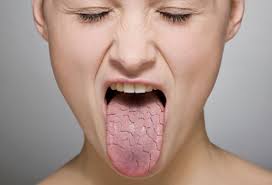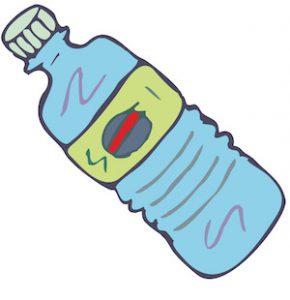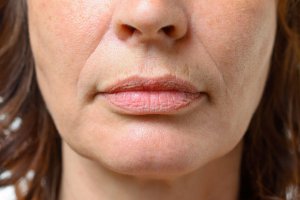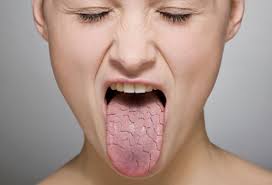Author: Lizzie Smith – blog last updated on Saturday 3rd February 2024
If you suffer from a dry mouth (xerostomia), most everyday activities, such as talking, swallowing and eating, can become difficult or even painful. That’s annoying, but too little saliva also harms oral health. In this article, we’ll look at the possible causes of dry mouth and how you can alleviate the symptoms.
Dry mouth complaints and your oral health
Harmful bacteria can quickly proliferate in a dry mouth, increasing dental plaque and resulting in more tartar, gum infections and caries (cavities). If you have a dry mouth, bad breath is also more common.
You should always take dry mouth complaints seriously. You do this by looking for the cause of the saliva shortage. The possible causes for a dry mouth are diverse, but in this article, we’ll show you what cause or causes play a role.

Causes of dry mouth complaints
1. Dehydration of the body
If you’re dehydrated, your mouth will naturally dry out as well. Sometimes, this is temporary due to vomiting, diarrhoea or a hangover. The use of diuretics or excessive urination in the case of poorly controlled diabetes also reduces the moisture content in the body and, therefore, also in the mouth.
2. Speaking for a long time
People who speak professionally for a long time continuously move dry air through the oral cavity. The salivary glands can’t keep up with this. This is why you’ll notice water readily available at lecterns and on conference tables, so you can take a sip now and then.

3. Medication and medical treatments
Many medications have a dry mouth as a side effect. The list includes painkillers, antidepressants, antihistamines (medicines for itching and allergies), sleeping pills, diuretics (water pills), medication for epilepsy, medication for heart rhythm disorders and high blood pressure and medicines for Parkinson’s disease.
Discuss this with your doctor if you suspect your dry mouth symptoms are caused by medication. In some cases, you can switch to an alternative drug.
Many older people suffer from a dry mouth, although this usually doesn’t appear to be related to age. The older people get, the more medicines they take. Therefore, the risk of medication causing a dry mouth increases.

Chemotherapy or radiotherapy around the head and neck area can permanently damage the salivary glands. As a result, they produce less or no saliva at all. This damage can even be permanent, leaving the patient forever dependent on artificial saliva substitutes.
If a salivary gland has been removed, this will also lead to less saliva production.
In these cases, you can’t always remove the cause. However, you should still choose oral care products against a dry mouth. While this won’t solve the cause, it will at least alleviate the complaints.
4. Decreased functioning of the salivary glands
A temporary problem may be that the salivary glands have become lazy. This happens if you chew little or not at all for a while. For example, after dental surgery or a broken jaw. Conversely, the salivary duct can become blocked. Saliva is then produced but doesn’t end up in the oral cavity.
5. Mouth breathing
You’re supposed to always breathe through your nose. The air is prepared for absorption into the lungs in the nasal and sinus cavities. This means the air is heated and humidified. So, when you breathe through your mouth due to a cold or out of habit, a lot of dry air circulates.
Mouth breathing can become a habit. So, it’s a good idea to realise you’re breathing through your nose. Then, as soon as you breathe through your mouth again, try to break it and breathe through your nose.
At night, it’s a different story. If you sleep with your mouth open, there’s a good chance you’ll wake up with a dry mouth. During your sleep, you’re in deep relaxation and can’t be aware of mouth breathing. Then, it’s important to ensure your mouth remains closed.

6. Hormones
Hormonal fluctuations regularly lead to a dry mouth. This happens to women more often than men.
Menopause is a natural developmental stage in a woman’s life. The fertile period ends and the hormones involved undergo a significant shift. The production of oestrogen and progesterone stops and these changing hormone levels mean the salivary glands receive fewer signals to produce saliva. The saliva that’s produced may feel thicker. A dry mouth is, therefore, a common complaint during menopause, sometimes in combination with a burning mouth or a burning tongue.
Dry mouth also occurs in pregnant women, partly due to hormone fluctuations. In addition, the fluid balance in the body changes because more blood is produced. If a pregnant woman also has to take medication, the salivary glands can become seriously disrupted.
7. Medical conditions
Some conditions have dry mouth as a major symptom. Examples of this are diabetes and Sjögren’s syndrome.
- In untreated or poorly controlled diabetes, there’s insufficient insulin, which means the body cells can’t absorb sugars from the blood. The sugars then continue to circulate in the blood. The body responds by “thinning” the blood to reduce the sugar concentration. This removes moisture from the tissues, with the symptoms of thirst, dry mouth and frequent urination. The sugar metabolism must be restored with the correct insulin dose to resolve these symptoms.
- Sjögren’s syndrome is a chronic autoimmune disease in which fluid-secreting glands, such as the lacrimal and salivary glands, become inflamed. This causes the mucous membranes in the mouth, eyes and other body parts to dry out. The syndrome mainly occurs in women over 40, but in principle, it can occur in anyone. The exact cause is unknown, and the condition can’t be cured. Therefore, The treatment aims to combat the symptoms, including the lack of saliva.

8. Mental illness
Stress and anxiety can inhibit the salivary glands as a physical response. This already happens when you’re startled or afraid of something. But with chronic psychological complaints, the mouth can also dry out chronically. The brain then sends too few signals to the salivary glands, causing them to be insufficiently stimulated to produce saliva.
In these cases, you can take measures to prevent dry mouth complaints. But removing the cause is even more essential, and you should consult your doctor. If you’re undergoing treatment and taking medication for a psychological condition and your mouth is dry, it’s still a good idea to protect your teeth and gums against dry mouth.
9. Lifestyle-related factors
Not drinking enough water can lead to dehydration and a dry mouth. Alcohol, caffeine and salty and spicy food have a dehydrating effect.

Smoking also dries out the mouth. The hot smoke evaporates the saliva faster, and inhaling and exhaling the dry smoke air also dries out the oral mucous membranes. Quitting smoking is better for everyone’s oral health, but in the case of dry mouth, it’s unavoidable. It’s not only tobacco either, cannabis also has a strong drying effect on the oral mucosa.
Combinations of these habits can undoubtedly lead to mouth dryness.
10. Wrong ingredients in toothpaste or mouthwash
As strange as it may sound, not all toothpaste and mouthwash ingredients are suitable for oral health. Ingredients such as alcohol, SLS (sodium lauryl sulphate) or other drying or acidifying ingredients should actually be avoided. In the case of a dry mouth, these remedies can worsen and even cause the problem.
How to resolve dry mouth complaints
Whatever the cause of your saliva shortage, adjusting your daily oral hygiene is a good idea. While your doctor’s helping you find the reason, you can at least hydrate your mouth better and more often.
Sometimes, the cause is known but can’t be removed. For example, if you use medication or due to hormonal changes during menopause or pregnancy. However, you can alleviate dry mouth complaints.
In both cases, it’s best to use mouth-friendly products. Instead of drying out your mouth further, they hydrate the mucous membranes and, if possible, stimulate saliva production.

In addition, there are special gels, sprays and chewing gum for dry mouth, which relieve the unpleasant dry feeling and make it easier to talk, swallow and eat.
Read more here about the remedies for dry mouth due to the various causes.
Sources
British Dental Nurses‘ Journal: Diagnosing and managing dry mouth
British Dental Journal: Helping to alleviate the stress of dry mouth

